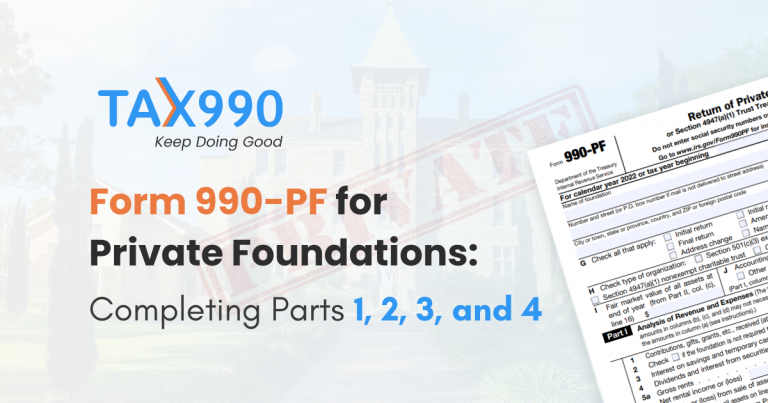Estimated reading time: 20 minute(s)
t is a common misconception that the nonprofit sector is always cut and dry. There are many types of organizations that can be considered a nonprofit or a for-profit depending on their programs, services, and structure. This is especially true when it comes to hospitals. While many are run with a for-profit business structure, many are also operated as nonprofit organizations.
In this blog, we will take a closer look at what defines a nonprofit hospital in contrast to its for-profit counterparts. Additionally, of course, we will provide an overview of the filing requirements that hospitals are required to complete annually to maintain their tax-exempt status.
Background on 501(c)(3) Tax-Exempt Status
Let’s start with the most basic components of a nonprofit organization. The IRS deems that any nonprofit that is organized and operated exclusively for a charitable purpose is eligible to obtain federal tax exemption from the IRS. This status is not automatically given, organizations must apply for tax exemption by filing Form 1023, or 1023-EZ with the IRS.
In turn, the IRS will provide them with approval and appropriate documentation to signify that they are now considered exempt from federal income tax. This documentation comes in the form of an IRS determination letter. In this letter, the organization can find basic information such as their tax year and EIN.
The organization is not granted tax-exempt status 501(c)(3) status for the entirety of its existence. The organization will be required to file a 990 Series Return annually to verify that they are acting in accordance with IRS regulations and being a good steward of the donations that are contributed towards their charitable purpose. These returns are crucial as they are made public records for donors, grant-making organizations, and more to view the financials of nonprofit organizations.
What makes a Hospital Tax-Exempt?
Much like traditional charitable organizations, hospitals must meet certain requirements. According to the IRS, hospitals must meet the following conditions, in addition to the basic requirements under 501(c)(3):
- The net earnings from the hospital can NOT benefit any individual or private shareholder.
- Their activities should not be focused on spreading propaganda or attempting to influence legislation.
- There should be no participation in, against, or on behalf of any political campaign or candidate for political office.
Much like any nonprofit organization, hospitals need to apply for tax-exempt status and receive approval from the IRS. In addition to the basic requirements above, hospitals must be able to pass the organizational and operational tests from the IRS to be eligible.
Meeting the Organizational and Operational Tests
The organizational test from the IRS is designed to ensure that the hospital is organized and structured in a way that benefits its exempt purposes. Organizations that are created based on the following types of information will likely pass the organizational test.
- Their activities and purposes are built around one or more exempt purposes.
- The organization doesn’t participate in programs and activities outside of its exempt purpose(s).
- There is no focus on political campaigns, influencing legislature, or being an ‘action’ organization.
- All of the hospital’s assets are dedicated to its charitable purpose even after it is dissolved.
The operational test from the IRS is all about how the hospital operates. This consists of how it is staffed, how patients are accepted and charged, and how leadership is structured.
There are four components to the IRS’ operational test:
- Requirement to operate exclusively for exempt purposes
- Prohibition against inurement
- Prohibition against becoming an action organization; and
- Prohibition against substantial private benefit
How a Tax-Exempt Hospital Operates
The IRS requires that tax-exempt hospitals uphold the community benefit standard. This means that the hospital exists for the purpose of serving the larger public rather than any private interest. The hospital must also serve a wide enough variety of individuals to solidify it as an important resource in its community. Some ways that a public, nonprofit hospital can meet this standard are by offering the following services.
An Open Emergency Room
Hospitals can satisfy the community benefit standard by offering a 24/7 emergency room that is open to all. The doctors and other medical personnel must accept and care for every patient regardless of their ability to pay.
An Open Medical Staff Policy
This means that the hospital is not doctor-owned, these types of hospitals, while less prevalent these days, generally limit the patients that are admitted and cared for. A hospital with an open staff policy hires any and all medical professionals based on staffing needs and the candidate’s credentials.
An Open Care Policy
Hospitals must satisfy this and it is likely their exempt purpose, serving all individuals equally regardless of their ability to pay. The hospital must accept and treat all individuals for emergency and non-emergency care, regardless of whether or not they are able to pay for these services. Doing this benefits the community as a whole rather than benefiting a group of individuals with a certain financial status.
Financial Assistance and Profits
Making financial assistance available to those who need it is a component of meeting the community benefit standard. The hospital must use any surplus funds for their charitable purpose rather than distributing it to shareholders. This can include bettering the quality of patient care, improving the facilities, providing education and training, or funding research programs.
What are the IRS Filing Requirements for Nonprofit Hospitals
All hospitals that obtain tax-exempt status are required to file annual returns with the IRS. The Form 990 should be used for this purpose. This is the 990 long form and requires all the additional information that hospitals must provide to the IRS.
In addition to filing 990, hospitals will need to complete and attach Schedule H. This schedule is designed specifically for hospitals and requires important information such as,
- Part I – Financial Assistance and Certain Other Community Benefits at Cost
-
-
- This part of the schedule focuses on how the hospital has met the community benefit standard and requires information to back it up.
-
- Part II – Community Building Activities
- Part III – Bad Debt, Medicare, and Collection Practices
- Part IV – Management Companies and Joint Ventures (Owned 10% or More by Officers, Directors, Trustees, Key Employees, and Physicians)
- Part VI – Supplemental Information
-
- This consists of any additional documentation needed to answer any of the questions in the previous sections of the schedule.
Complete your Form 990 with Tax990!
Hospitals, just like all other nonprofit organizations can benefit from the tools and features of Tax990! E-filing Form 990 is simple with built-in audit checks and a cloud-based application that enables an entire team to file accurately from one secure account.
In addition to an easy and intuitive filing process, Tax990 offers the schedules that hospitals need to attach when filing with the IRS. Amendments are available and organizations can easily correct and retransmit any rejected forms as needed.
Need a simple solution to meet the 990 e-filing needs of a tax-exempt hospital? Create a free Tax990 account today to experience all of the streamlined features!




